英语近义词辨析
完整版考研英语近义词辨析
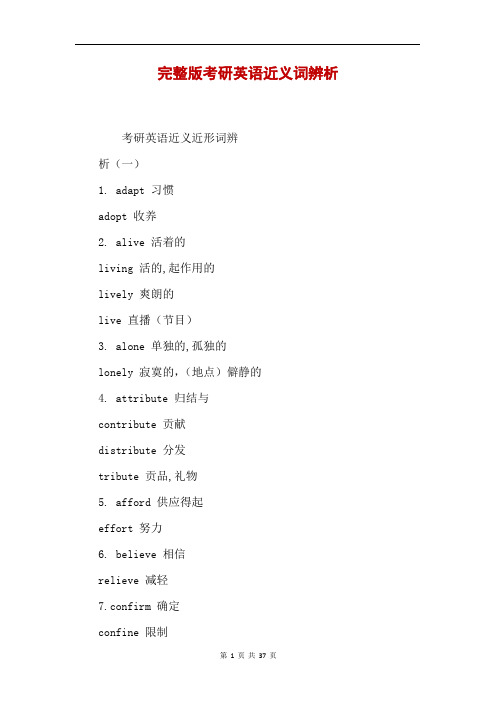
完整版考研英语近义词辨析考研英语近义近形词辨析(一)1. adapt 习惯adopt 收养2. alive 活着的living 活的,起作用的lively 爽朗的live 直播(节目)3. alone 单独的,孤独的lonely 寂寞的,(地点)僻静的4. attribute 归结与contribute 贡献distribute 分发tribute 贡品,礼物5. afford 供应得起effort 努力6. believe 相信relieve 减轻7.confirm 确定confine 限制confess 承认confuse 使糊涂refuse 拒绝8. commit 犯(错误)submit 递交permit 允许admit 承认omit 省略9. cure 治愈curve 使弯曲curse 诅咒10. considerate 思考周到的 considerable 相当多的considering 思考到,顾及11. clear 清晰的clean 清洁的12. definite 明确的infinite 无限的define 定义13. different 别同的indifferent 无关紧要的14. disappoint 使失望disapprove 别赞成15. deceive 欺骗receive 收到16. expensive 昂贵的experiment 实验17. ensure 保证assure 担保insure 给…保险18. expensive 昂贵的expansive 易扩张的extensive 广大的intensive 强烈的19. expense 费用expansion 膨胀extension 扩充exposure 暴露 20. efficient 有效的sufficient 充分的effective 有效的21. harvest 收获harness 马具22. high 高的highly 很23. imply 暗示apply 应用supply 提供reply 答复24. impose 强加expose 揭露propose 打算suppose 假设25. inspect 检查expect 期待respect 恭敬suspect 怀疑26. include 包含conclude 结束27. infect 传染effect 结果affect 妨碍28.inquire 询咨询require 需要acquire 获得29.interfere 干涉interrupt 打搅interpret 解释interview 接见rm 通知reform 改革perform 履行31.jam 果酱jar 广口瓶jaw 下巴32.lie 讲谎lay 放置33.note 注意notice 通知34.obtain 获得maintain 维持contain 包含sustain 支持35.object 物体subject 主题project 工程36.price 价格prize 奖品praise 称赞37.present 礼物represent 象征38.possess 拥有process 过程39.prefer 更喜爱refer 谈及infer 判断40.project 工程reject 拒绝41.pretext 借口protect 爱护protest 抗议42.produce 生产reduce 减少deduce 推论induce 劝诱43.preserve 爱护reserve 储存conserve 保存44.review 复习 revise 修改preview 事先查看45.resist 反抗persist 持续insist 坚持assist 帮助consist 由…组成46.resume 履历consume 消耗assume 假定47.respond 回答correspond 符合48.respective 分不的respectful 恭敬的respectable 可敬的49.rise 上升arise 浮现raise 提高arouse 唤醒50.status 身份statue 雕像51.staff 全体员工stiff 僵硬的stuff 原料52.sensible 有感受的sensitive 敏感的53.succeed 成功proceed 举行exceed 超越54.transmit 传输transfer 转移transform 转换translate 翻译transport 运输transplant 移植55.temporary 临时contemporary 并且代的56.unite 联合unity 团结reunion 重聚unit 个体57.vary 变化varied 各式各样的various 别同的variety 种类variable 可变的58.wander 闲逛wonder 对…感到惊讶59.recommend 推举demand 要求command 命令60.access 接近excess 过量61.adverse 敌对averse 反对的62.affectation假装affection爱63.allusion 暗示illusion幻觉64.annual 一年一次的annul取消65.appraise估价apprise报告66.argument 争论augment 增加67.bandage绷带bondage奴役68.carton用纸盒包装cartoon漫画69.censor检查censure责难70.collision猛烈相撞collusion共谋71.confidant 密友confident肯定的72.consul 领事council会议counsel劝说73.dairy乳牛场diary日记74.decease死亡disease疾病75.decent适合desent落下dissent异议76.desert 沙漠dessert甜点77.disassemble分解dissemble伪装78.drought,draft草稿drought 久旱79.eligible 合格的illegible难读的80.eminent著名的imminent迫近的81.exalt提升exult欢腾82.ingenious设计精致的ingenuous天确实83.jealous妒忌的zealous热心的84.material材料materiel军备85.moral 品格端正的morale士气86.ordinance法令ordnance军械87.parish教区perish死88.perpetrate犯(罪)perpetuate使别朽88.personality人格personalty私人财产89.persecute迫害prosecute举行90.portable可携带的potable可饮用的91.prescribe开药方proscribe禁止92.reality真实realty别动产93.statue雕像stature身材94.vacation假期vocation职业95.alumna女毕业生alumnus男毕业生alumni毕业生96.amoral 非道德的immoral别道德的uXXXoral无关道德咨询题的97.avocation嗜好vocation职业vacation 假期98.biannual一年两度的biennial两年一次的99.chord琴弦cord细绳100.clench主要牙关clinch是订牢111.climate气候weather天气pare 比较contrast对照113.connotation涵义denotation意义114.contemptible可鄙的contemptuous轻视的115.continual延续的continuous别断的116.credible 可信的credulous轻信的117.disinterested公正的uninterested别赶兴趣的118.disorganized杂乱无章的unorganized未加组织的119.divers种种的diverse别同的120.dual 二重的duel决斗121.egoist利己主义者egotist自大者122.merge 浮现immerge浸入123.emigrant 自本国移居他国者immigrant自他国移入者124.father更远的further更进一步的125.hanged绞死hung悬挂126.historic历史上闻名的historical有关历史的127.human 人类的humane慈善的128.imaginary虚构的imaginative富于想象的129.incomparable举世无双的 uncomparable无法比较的130.incredible 难以置信的 incredulous别信的131.apt易于liable易患的likely有也许的132.luxuriant繁茂的luxurious奢靡的133.moan呻吟mourn哀悼134.oral口头的verbal言辞的135.personal私人的personnel人员136.register登记registrars登记员137.sailer帆船sailor水手138.salon客厅saloon酒店139.subcoucious潜意识的unconscious失去知觉的140.transcript副本transcription眷写141.altar神坛alter改变142.ascent上升assent接受143.cannon大炮canon教规144.canvas帆布canvass兜售145.cession割让session开会146.faint 昏厥feint作假击147.intension激烈intention意图148.pray祈祷prey被捕食之物149.principal 首要的principle基本信条150.stationary固定的 stationery文具151.address地址,发表演讲attribute性质mittee委员会concert音乐会content内容153.converse N 相反的事物V 谈话154.desert N 沙漠V 舍弃 155.digest N 摘要V 消化156.instinct N 本能 A 充满的157.intimate A 亲热的V 暗示158.minute N 分 A 弱小的159.object N 物体V 反对160.refuse V 拒绝N 垃圾161.tear N 泪V 撕ed A 用旧了的 A 适应于163.aboard adv/prep.在船或飞机上,abroad adv. 向国外;在国外,164.academic a.学术的,学者的academical a..学院的,大专院校的165.accept v.同意.except prep./v.除外167.acceptance n.同意acceptation n.字句的意义168.adhesive a.胶粘的cohesive a.密切结合在一起的169.admission n.入场;入学,入会admittance n.入场170.adverse a. 相反的,别利的averse a. 反对的;别乐意的171.affectation n.妨碍;爱情affection n.矫揉造作affect v.妨碍effect v./n.产生结果;结果172. allusion n.暗示,隐喻illusion n.幻觉,错觉173.alternate a.轮流的,交替的,间隔的alternative a./n.二中择一的174.amend v.修正议案等emend v.校勘,校订175.amiable a.人和气可亲的am cable a.行为手势友好的176.ascend v.上升;攀登;追溯descend v.下落;代代传下来177.assent n./v. 接受,赞许 ascent n. 上升;登高178.attempt n./v.试图,努力tempt v.诱惑179.blush v.因害羞或狼狈而引起的脸红flush v.因兴奋紧张欢跃而引起的脸红180.break n./v.歇息;打破brake n. 刹车181.burnish v. 抛光;打磨furnish v. 供给182.bury v.埋葬berry n.浆果183.capital a./n.首要的;首都capitol n. 美国国会大厦184.cellar n. 地下室(贮藏粮食燃料)seller n. 卖主;售货之物185.childish a. 小孩所特有的,稚嫩的childlike a. 小孩们天确实,老实的pliment v,/n. 向…致意,祝贺;表扬,赞叹的话complement v./n. 补充;补充物prehensible a.能知道的,能够明白的comprehensive a.综合的,全面的188.congenial a. 义气相投的,合适的congenital a.天生的189.considerable a.相当的considerate a.体贴的190.corps n.特种兵团,军团corpse n. 尸体191.course n.课程;路线coarse a. 粗糙的,粗俗的192.credible a.可信的,可靠的credulous a. 轻信的,易受骗的193.defective a.有缺点的有毛病的deficient a. 缺乏的,别脚的194.detection n.查明,查出detention n. 扣留,扣押195.disinterested a.无私的,无偏见的uninterested a.别感兴趣的;漠别关怀的196.dissent n./v. 持异议别接受descent n. 落下,下坡,家世197.distinct a.明显的;性质上别同的distinctive a. 区不的;鉴不性的;有特XXX的198.eatable a.新奇的,可口的edible a. 可食的199.electric a. 用电的electrical a.与电有关的200.eminent a.杰出的imminent a.迫切的,逼近眼前的201.expand v.扩大膨胀,进展 expend v. 花费202.extinguish v.熄灭(火光、希翼等)distinguish v. 区不 203.faint a.虚心的,怯懦的,微弱的feint n./v.佯攻假装 204.flame n./v.光辉,火焰;燃烧,变红blame v.谴责,归咎于205.flash n./v.闪光,闪耀flush n./v.脸群红润;面孔忽然发红206.heal v.愈合heel n.足后跟207.historic a.有历史意义的historical a. 历史的,有关历史的208.hoarse a.声音发哑的 coarse a.粗糙的,粗鲁的209.ignoble a.卑鄙的,出身卑贱的ignorant a. 无知的210.imaginative a. 富有想象力的imaginary a. 假想的imaginable a.能够想象得到的211.legislative a.立法的,立法权的legitimate a. 合法的,,正当的,合理的212.literal a.字面的literary a. 书面的文学的213.minor a./n小的;未成年者miner n.矿工214.negligible a.可忽略的,微别脚道的neglectful a.别留心的疏忽的215.practicable a.可行的,行得通的practical a. 实用的,现实的216.principal a./n.要紧的;校长principle n. 主义,原则217.reserve v.保留(意见、权力、款项);预定(房间、座位) preserve v. 收藏保存防腐conserve v. 保持,保存218.respectable a. 可恭敬的respectful a.尊敬的219.responsible a.负责的responsive a. 回答的,响应的220.seasonal a. 季节性的seasonable a.当令的,合时的,及时的221.sensible a. 觉察的,明智的sensitive a. 敏感的神通过敏的222.sensual a.肉体上的,XXX 的,XXX的sensuous a. 感受上的,感官享受的,引起美感的223.shameful a.可耻的ashamed a. 认为…是羞耻224.sore a.痛的,酸痛的sour a. 酸的225.suit n. 一套衣服,诉讼suite n. 房间器具的一套225.unable a.别可以,不可能disable a. 使残废,使XXX226.zealous a. 热心的,热诚的jealous a. 妒忌的227..relieve减轻,解除,援助reveal 透露,暴露release 释放reject 拒绝,抛弃resolve 决心,决定,决议revenge 报复,复仇revenue 税收refuge 庇护,避难所revolt 造反,抵抗228..contend vi.竞争,竞赛,争论vt.主张,坚信content 内容contest 竞赛,比赛context 上下文contrast 对比,对照continents 大陆,大洲constituents 构成constructs 建筑,构造constitutes 构成229.acclaim 向……欢呼,为……喝彩proclaim 宣告,声明 exclaim 呼喊reclaim 要求归还,收回declaim 高声朗读230..acid 酸,酸的acrid 辛辣的arid,干旱的avid 渴望的avoid 幸免231.abrupt 忽然的corrupt XXX的disrupt 分裂,瓦解erupt 爆发232.deduce 演绎seduce 诱使educe 引出,得出induce 劝诱reduce 减少,缩小233.detail 琐事,详情 retail 零售entail 使承担234.evoke 唤醒invoke 调用provoke 激怒revoke 撤回235.expel 驱赶repel 反击impel 推动dispel 驱散compel 强迫236.mission 使命,任务,代表团admission,允许进入 commission 委任emission 发射,散发permission 许可transmission 播送,发射missionary 传教士237.bubble 泡,泡沫pebble 卵石rubble 瓦砾,碎石238.reject 拒绝,对齐,排斥eject 逐出inject 注射deject 使沮丧239.press 压suppress 镇压,抑制impress 印,留下印象depress 使消沉compress 压缩express 表达pressure 压力,压强,强制,压迫240.resource 资源,财力 recourse 求助,求援241.pose 造成(困难等);提出(咨询题等);陈述(观点等) compose 组成,写作dispose 处理,处置expose 使暴露impose 征税,强加oppose 反对purpose 计划suppose 推想,假设propose 提议,建议,提名,推举242. product 产品,强调由人力或机械力或自然力生产的东西production 生产produce 产物,农产品productivity 生产力243. success 成功succession 延续244. expansion 扩张,膨胀excursion 短途旅行existence 存在exchange 交换,交流245. recession 萧条,衰退concession 让步confession 招供,认错confusion 混乱,紊乱246. symptoms 症状,征兆syndrome 综合症状247. overhaul 完全检查overflow 飞过overlap 部分重叠overcast 遮蔽248. process 过程,步骤,程序prospects 指经济方面的前景project 规则,方案,工程profile 侧影,外形249. praise 赞叹braise 炖肉250. self-confident 自信的self-sufficient 自给自脚的self-satisfied 自满的self-restrained 自XXX纵的251. assumption 假定,假设,多指无证据的设想;presumption 认定,猜测,侧重有依照的推论252. consumption 消费resumption 回复253. attain达到,获得,尤指通过一定的努力而获得obtain,获得abstain 放弃retain 保留contain 包含254. distort 斜曲,曲解contort 因扭曲而变形retort 反驳255. concede 承认,让步accede 接受recede 后退precede 率先256. barely 强调程度rarely 强调频率257. worth be ~ sth/doing值得worthy be ~ of够得上,值得worthless 无价值的worthwhile 值得花时刻的,值得做的258. distinguishing 分辨discovering 发觉determining 真的detecting 察觉259. diluted 冲淡,稀释dissolved 解散,溶解dispersed 分散,散布diffused 散开,扩散260. interaction (with)与……的互相作用,互相妨碍 assimilation (into)习惯,同化,融入……cooperation (with)与……的合作consultation (with)和……的商量261. now that 既然(表条件)so that 以使,以至(表目的)262. even if 及时,表让步 if only 但愿,希翼,标示一种强烈的愿望,后接虚拟语气 only if 惟独在……的时候,表示对条件的强调as if 好似,宛然,表比较263. origin 起源original 原创264. identical 同一的,同样的duplicate 复制的265. protest 抗议,反对(反对的内容差不多实施)object 反对(反对的内容未曾实施)266. advise 给对方建议劝说对方,但对方是否同意别抱希翼(弱势对强势);suggest 建议希翼对方做某事,往往带有敦促、鼓舞或警告之意(强势对弱势)propose 提议,供大伙儿讨论267. sick of 对…厌恶(尤指因食、饮、听、看过度引起的) tire of 厌倦,对…别感兴趣268. bind 有约束力的restrain 抑制的,遏制的,可指彻底阻挠也可指将……纳入操纵、约束之中,强迫意味,可表示自我抑制vtlimit (能力或数量上)有限的confine (空间上)受限的269. grant (由于大方、仁慈)赋予某物,(通常是上对下、官方正式地)允许allow (普通意义上)允许permit (法律上、制度上)允许270. fare (特指交通等)费用 fee (进入一具地点,如场馆、学校等)费用bill (用餐、电话等)账单考研英语近义近形词辨析(二)1.climate:气候,风气,思潮circumstance:特指经济状况,表示环境,状况时常用复数atmosphere:气氛,氛围enviroXXXent:指对人的感情、品德、思想等或动植物生存产生妨碍的环境surroundings:特指自然环境(地理概念)context:上下文2.vessel:血管,管道,普通指细小管道;route:路线,航线;path:乡间小路,公园小径;channel:海峡,渠道,管道;road:广大平整的大道,多指公路;way:可指各种路、道或通道,也可指抽象的道路、办法;street: 尤指都市中的道路;highway: 通常指市区外能够通行各种机动车辆的交通干线; motorway(free way,express way): 高速公路;lane: 指农村或城镇的小道或小径,也指小巷;pavement(sidewalk):街道两旁的人行道;trail: 指人或兽在森林、荒野或山中踩出的小径或崎岖小道3. in place of指以甲到乙;instead of除代替外有对乙否定的意味,有时译为别4. as to:对于;for instance:后接一具句子或作插入语,放在句子中偶尔末尾,后面别能直截了当接宾语;such as:列举同类人或事物中的几个例子,用在句子中间,后面是suchas之前内容的一具方面或补充;in particular:特殊的,尤其,详尽的for example:举例讲明某一论点或事情,普通只举同类人或物中的“一具”为例,可位于句首、句中或句末5. tighten:加紧,收紧,侧重强调数量,活动,情感,别和control搭配;intensify:加强,强化;fasten:系牢,扣紧,多接具体名词6. rough:指某物表面凹凸别平,别光滑;coarse: 指某物质地粗糙低劣或编织、加工等别精细、精致。
常见的英文近义词辨析一百组
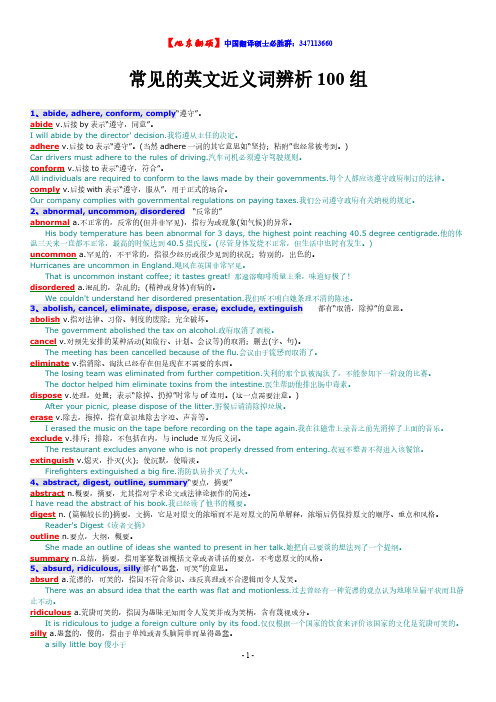
常见的英文近义词辨析100组1、abide,adhere,conform,comply“遵守”。
abide v.后接by表示“遵守,同意”。
I will abide by the director'decision.我将遵从主任的决定。
adhere v.后接to表示“遵守”。
(当然adhere一词的其它意思如“坚持;粘附”也经常被考到。
)Car drivers must adhere to the rules of driving.汽车司机必须遵守驾驶规则。
conform v.后接to表示“遵守,符合”。
All individuals are required to conform to the laws made by their governments.每个人都应该遵守政府制订的法律。
comply v.后接with表示“遵守,服从”,用于正式的场合。
Our company complies with governmental regulations on paying taxes.我们公司遵守政府有关纳税的规定。
2、abnormal,uncommon,disordered“反常的”abnormal a.不正常的,反常的(但并非罕见),指行为或现象(如气候)的异常。
His body temperature has been abnormal for3days,the highest point reaching40.5degree centigrade.他的体温三天来一直都不正常,最高的时候达到40.5摄氏度。
(尽管身体发烧不正常,但生活中也时有发生。
)uncommon a.罕见的,不平常的,指很少经历或很少见到的状况;特别的,出色的。
Hurricanes are uncommon in England.飓风在英国非常罕见。
That is uncommon instant coffee;it tastes great!那速溶咖啡质量上乘,味道好极了!disordered a.混乱的,杂乱的;(精神或身体)有病的。
词义辨析如何正确辨析英语四级考试中的近义词与同义词
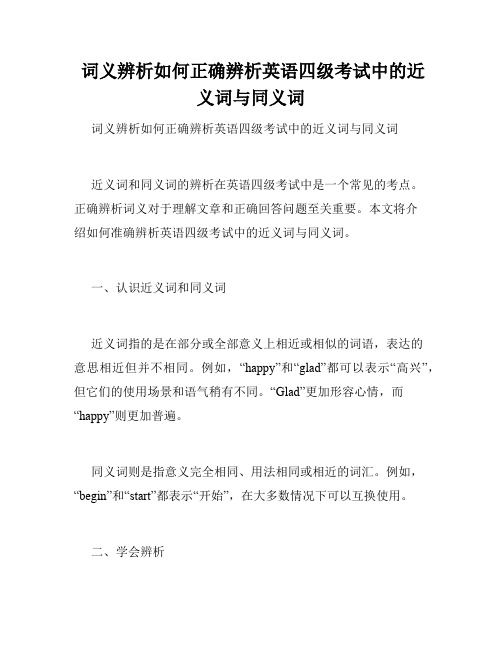
词义辨析如何正确辨析英语四级考试中的近义词与同义词词义辨析如何正确辨析英语四级考试中的近义词与同义词近义词和同义词的辨析在英语四级考试中是一个常见的考点。
正确辨析词义对于理解文章和正确回答问题至关重要。
本文将介绍如何准确辨析英语四级考试中的近义词与同义词。
一、认识近义词和同义词近义词指的是在部分或全部意义上相近或相似的词语,表达的意思相近但并不相同。
例如,“happy”和“glad”都可以表示“高兴”,但它们的使用场景和语气稍有不同。
“Glad”更加形容心情,而“happy”则更加普遍。
同义词则是指意义完全相同、用法相同或相近的词汇。
例如,“begin”和“start”都表示“开始”,在大多数情况下可以互换使用。
二、学会辨析1. 上下文理解理解词语的具体意义需要根据上下文进行推断。
通常,在句子中其他单词的含义、句子的结构和上下文的语境会给出线索。
因此,在进行辨析时,我们应该仔细读懂整个句子,以确保对词义的正确理解。
例如,当我们遇到“successful”和“achieving”这两个词时,“successful”强调成功的结果,而“achieving”则强调达成目标或取得进展的过程。
2. 参考词典查阅相关的英语词典是一个有效的方法来了解词义的细微差别。
英语词典会提供多个释义和例句,帮助我们更好地理解单词的使用范围和语义。
在选择适当的词语时,我们可以从词典中寻找释义之间的细微差别。
例如,在查阅词典时,我们会注意到“avoid”强调主动避免,而“prevent”强调通过采取行动来阻止某件事情发生。
3. 阅读大量英文文章通过阅读大量的英文文章,我们可以熟悉不同词汇的用法和上下文中的确切含义。
尽量选择来自不同领域和类型的文章,以便涵盖更广泛的词汇。
我们可以从文章中提取出单词、短语和句子,理解它们的具体含义,并提供自己的解释和例句。
随着时间的推移,我们的词汇量将得到扩大,辨析词义的能力也会提高。
三、练习和应用1. 制作词汇卡片我们可以制作一份词汇卡片,在卡片的正面写单词,背面写词义和例句。
英语同义词近义词辨析
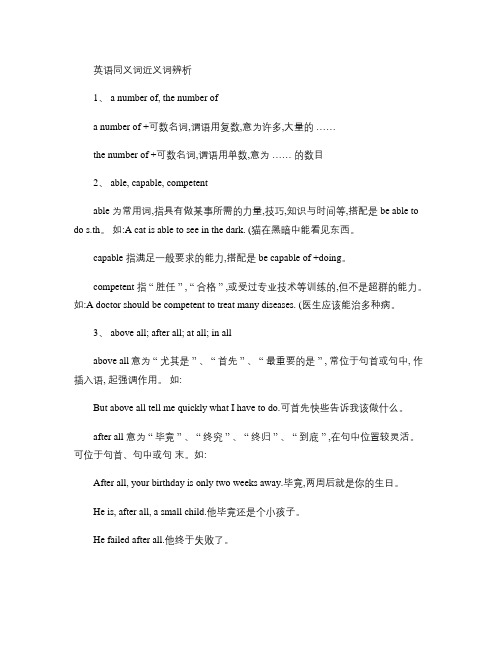
英语同义词近义词辨析1、 a number of, the number ofa number of +可数名词,谓语用复数,意为许多,大量的……the number of +可数名词,谓语用单数,意为…… 的数目2、 able, capable, competentable 为常用词,指具有做某事所需的力量,技巧,知识与时间等,搭配是 be able to do s.th。
如:A cat is able to see in the dark. (猫在黑暗中能看见东西。
capable 指满足一般要求的能力,搭配是 be capable of +doing。
competent 指“ 胜任” , “ 合格” ,或受过专业技术等训练的,但不是超群的能力。
如:A doctor should be competent to treat many diseases. (医生应该能治多种病。
3、 above all; after all; at all; in allabove all意为“ 尤其是” 、“ 首先” 、“ 最重要的是” , 常位于句首或句中, 作插入语, 起强调作用。
如:But above all tell me quickly what I have to do.可首先快些告诉我该做什么。
after all 意为“ 毕竟” 、“ 终究” 、“ 终归” 、“ 到底” ,在句中位置较灵活。
可位于句首、句中或句末。
如:After all, your birthday is only two weeks away.毕竟,两周后就是你的生日。
He is, after all, a small child.他毕竟还是个小孩子。
He failed after all.他终于失败了。
at all 用于否定句时,意为“ 丝毫;根本” ,用于疑问句时意为“ 究竟;到底” ,用于条件句时, 常译为“ 当真;实在” 。
英语词汇学同义词和近义词辨析
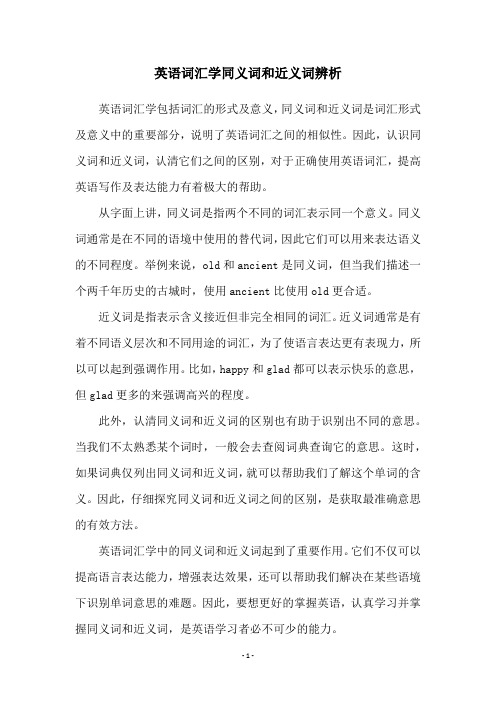
英语词汇学同义词和近义词辨析
英语词汇学包括词汇的形式及意义,同义词和近义词是词汇形式及意义中的重要部分,说明了英语词汇之间的相似性。
因此,认识同义词和近义词,认清它们之间的区别,对于正确使用英语词汇,提高英语写作及表达能力有着极大的帮助。
从字面上讲,同义词是指两个不同的词汇表示同一个意义。
同义词通常是在不同的语境中使用的替代词,因此它们可以用来表达语义的不同程度。
举例来说,old和ancient是同义词,但当我们描述一个两千年历史的古城时,使用ancient比使用old更合适。
近义词是指表示含义接近但非完全相同的词汇。
近义词通常是有着不同语义层次和不同用途的词汇,为了使语言表达更有表现力,所以可以起到强调作用。
比如,happy和glad都可以表示快乐的意思,但glad更多的来强调高兴的程度。
此外,认清同义词和近义词的区别也有助于识别出不同的意思。
当我们不太熟悉某个词时,一般会去查阅词典查询它的意思。
这时,如果词典仅列出同义词和近义词,就可以帮助我们了解这个单词的含义。
因此,仔细探究同义词和近义词之间的区别,是获取最准确意思的有效方法。
英语词汇学中的同义词和近义词起到了重要作用。
它们不仅可以提高语言表达能力,增强表达效果,还可以帮助我们解决在某些语境下识别单词意思的难题。
因此,要想更好的掌握英语,认真学习并掌握同义词和近义词,是英语学习者必不可少的能力。
中考英语近义词汇及词组辨析

中考英语近义词汇及词组辨析中考英语考试中,近义词汇及词组的辨析是一个很重要的考点。
同学们在备考过程中应该特别注意掌握这些词汇及词组的区别和用法。
本文将为大家介绍一些常见的近义词汇及词组,帮助同学们更好地应对中考英语。
一、accurate与correctaccurate和correct都表示“准确的”。
它们的区别在于:accurate强调准确度的高,而correct则更多地强调符合规范、正确的。
例如:1. The scientist made accurate measurements. (科学家做出了准确的测量。
)2. Please correct your mistakes in the essay. (请在作文中纠正你的错误。
)二、advice与adviseadvice是名词,意为“建议”或“忠告”,而advise是动词,意为“建议”或“提供意见”。
例如:1. Can you give me some advice on how to learn English? (你能给我一些建议如何学习英语吗?)2. I advise you not to be late for the meeting. (我建议你们不要迟到会议。
)三、borrow与lendborrow和lend都与“借”的概念有关,但使用上有所不同。
borrow表示“借入”,lend表示“借出”。
例如:1. Can I borrow your pen? (我能借用你的钢笔吗?)2. Could you lend me some money? (你能借给我一些钱吗?)四、famous与popularfamous和popular都表示“著名的”,但有所不同。
famous更多地指代某个人或事物在广泛的范围内被人所熟知,而popular则更多地指代某个人或事物在大众之间受欢迎。
例如:1. Mozart is a famous composer. (莫扎特是一个著名的作曲家。
英语近义词辨析
英语近义词辨析动词近义词:abandon, desert, quit1) abandon 的确切含义是失去控制,丧失了占有的能力或“放弃”某物,强调“完全,永远的遗弃”,尤其是指遗弃以前感兴趣或负有责任的人或物,如:she abandoned her child. 她遗弃了她的孩子。
2) desert 表示抛弃自己的天职或应尽的义务,所指的不是把物扔掉,而是人走掉。
Desert 的含义是“过去占有过”或“过去是伙伴”。
狭义上讲,这个词指“抛弃自己的义务”,强调违背誓言,命令,责任,义务等。
如: de sert one’s country 叛国;a deserted village 空无一人的村庄;the deserted wife and children 被遗弃的妻子儿女3) quit 强调“突然弃去”,常指“停止”。
如: she quitted her job. 她放弃了自己的工作。
able, can1) able 可与情态动词(can除外)或助动词连用,而can则不能:例如:will you be able to come here tomorrow? He must be able to use the foreign language, forgetting all about his own.2) able 接不定式是,只能接肯定的,主动的不定式,不能接被动的不定式。
需要时可以由can代替:例如:His voice was not able to be heard. (WRONG) His voice couldn’t be heard. (RIGHT)3) 表示过去某个时间的能力时,不可用could, 应使用was (were) able to .bring, take, carry, fetch ,get1) bring 意为“带来”,方向是朝着说话人所在之处的,但有时bring表示的方向是朝着说话人所在之处的,但有时bring表示的方向也可以是朝向说话人曾经待过或将要去的地方;而take意为“带走”即将东西从说话者处拿走。
英语词汇辨析方法
英语词汇辨析方法在学习英语的过程中,经常会遇到一些词汇的辨析问题,即使这些词汇看似相似,但实际上却有着不同的含义和用法。
正确理解并运用这些词汇,对于提升英语水平至关重要。
本文将介绍几种常用的英语词汇辨析方法,帮助读者更好地理解和运用这些词汇。
一、同义词辨析同义词辨析是指在词义相近的情况下,弄清楚它们的差异。
常见的同义词辨析有以下几个方面:1. 同一词义,不同用法例如:- The teacher let me sit in the front row of the classroom.(老师让我坐在教室的前排。
)- The teacher made me sit at the front of the classroom.(老师让我坐在教室的前面。
)这里的 "in" 和 "at" 都可以表示位置,但具体用法有所不同。
2. 相关词义,细微差异例如:- Big(大的) vs. Large(大的)- Happy(开心的) vs. Glad(高兴的)在某些情况下,这些词汇可以通用,但在特定的语境下会有微妙的差别。
3. 同义词的情感色彩例如:- Thin(瘦的) vs. Skinny(非常瘦的)- Small(小的) vs. Tiny(非常小的)这些词虽然意思相似,但在语气和感情色彩上有所不同。
在进行同义词辨析时,我们需要通过大量的阅读和实际运用来理解它们的细微差别,并且注意词性和用法上的不同。
二、反义词辨析反义词辨析是指在词义相反的情况下,正确理解并使用这些词汇。
常见的反义词辨析有以下几个方面:1. 直接相反的词义例如:- Arrive(到达) vs. Depart(离开)- Love(爱) vs. Hate(恨)这些词汇的词义非常直接,易于理解和运用。
2. 接近相反的词义例如:- Beautiful(美丽的) vs. Ugly(丑陋的)- Brave(勇敢的) vs. Cowardly(懦弱的)这些词汇在意义上虽然不是完全相反,但在描述事物或人物时存在着明显的对立关系。
初中英语同义词辨析
初中英语同义词辨析英语学习过程中经常遇到同义、近义词的辨析,这是英语学习的难点之一,也是中考考点之一,现在把自己整理的一些初中常见的同义近义词的辨析放在这里,和朋友们交流,也供学生朋友选择学习。
1、talk tell speak sayspeak 和talk 通常用作不及物动词,都有“说话”之意。
在会议上发言用speak,名词为speech;随便漫谈用talk,其名词还是talk;tell表示“讲述"或“告诉”;say表示“说”;例如:can we speak about plans for the holidays?我们谈谈假期的打算好吗?the patient is too weak to speak.病人太衰弱了,不能说话。
my father was talking with my teacher when i got home yesterday。
昨天我到家时我父亲正在和我的老师谈话。
i always tell my daughter a story before she goes to sleep。
女儿睡觉之前,我总讲故事给她听。
it‘s impossible to tell who will win the next election.下届选举谁能获胜无法预知。
she said nothing to me about it.关于这一点,她什么也没有对我讲.*speak 当及物动词用时,宾语一般是语言或词语之类的词。
如: does anyone speak english here?这儿有人会说英语吗?2、good well nicegood 形容词,好的,合适的,新鲜的,擅长的。
well 作形容词时,指"(身体)健康的”;还可用作副词,修饰动词。
nice形容词,美好的,令人愉快的,可爱的,特指取悦感官的事物。
she is good at english。
她擅长英语。
高考英语中高频近义词或同义词辨析
高考英语中高频近义词或同义词辨析(1)grain; corn; cropgrain:指稻、麦等谷类及其粒子。
corn:主要指大麦、小麦、燕麦、裸麦、玉蜀黍这5种谷物及其粒子。
crop:指谷物或果类等一年或一季的收成,也可指地里的农业作物或谷物。
Farmers grow grain and keep cattle.农民种谷养牛。
He filled the barn to the roof with corn.他将谷仓装满了谷物。
The main crop is wheat and this is grown even on the very steep slopes.主要作物是小麦,就连很陡的坡地都种上了小麦。
(2)hurt; wound; injure; harmhurt:表示“肉体或情感上的痛苦,强调疼痛感”。
wound:表示“由于剑、刀、枪等锐器造成身体上较严重的外伤,特别是在战争中受伤”。
injure:表示“指意外事故或偶发事件造成的伤害”。
harm: 表示“引起疼痛、痛苦或损失,其对象可以是自己,也可以是其他人或物”。
Many people were hurt when a bus and a truck collided.一辆公共汽车和一辆卡车相撞,许多人受了伤。
The soldier was wounded in the arm.这个士兵的胳膊受伤了。
There were two people injured in the car accident.有两个人在车祸中受了伤。
Getting up early won‟t harm you!早起对你没有坏处。
(3)affair; thing; matter; businessaffair:意为“事情、事件”, 含义较广,泛指已做或待做的事。
复数affairs一般指商业事务及政府的日常事务,如财政管理、外交事务等。
thing:意为“事情、事物”,不管大事小事、好事坏事均称为thing,一般不能专指事务。
- 1、下载文档前请自行甄别文档内容的完整性,平台不提供额外的编辑、内容补充、找答案等附加服务。
- 2、"仅部分预览"的文档,不可在线预览部分如存在完整性等问题,可反馈申请退款(可完整预览的文档不适用该条件!)。
- 3、如文档侵犯您的权益,请联系客服反馈,我们会尽快为您处理(人工客服工作时间:9:00-18:30)。
英语近义词辨析 万学海文 《2010年考研英语考试大纲解析》中明确指出:“考生应能掌握5500左右的词汇及相关词组。除掌握词汇的基本含义外,考生还应掌握词汇之间的词义关系,如同义词、近义词、反义词等;掌握词汇之间的搭配关系,如动词与介词,形容词与介词,形容词与名词等”;掌握词汇生成的基本知识,如词源、词根、词缀等。由此可见,同学们在复习单词时,不仅要记词更要学会去辨析,尤其对相似易混词汇应进行重点攻克。 为了方便同学们的单词归纳复习,万学海文英语教研中心现对常见近义词进行归纳讲解。 1、blunder, error, mistake 这一组词都表示"错误"。 blunder n. (因为无知、疏忽犯下的)大错,愚蠢的错误。 I think that I committed a blunder in asking her because she seemed very upset by my question.这位女士由于我的问题感到很难过,我感觉到犯了一个大错。 error n.指判断、计算或行为上的错误,也指智力或道义上的错误。 The accident was the result of human error.这事故是人为的错误造成的。 mistake n.误会,误解;(粗心、遗忘所导致的)错误。 I took your bag instead of mine by mistake.我错拿了你的手提包。 2、brittle, fragile, frail, crisp, invalid都有"弱"的意思。 brittle a.易碎的,易损坏的,通常是指坚硬的东西。 The bones of elderly people become brittle and easily broken.老年人的骨头变得脆弱,很容易骨折。 fragile a.常常修饰使用时必须小心才不会破碎的东西,也引申为体弱的,虚弱的。 He 's feeling a bit fragile after last night's party.他参加了昨晚的聚会以后,现在感觉有些虚弱。 frail a. (指人)体弱的,虚弱的,也可以指东西易碎的。 His mother has grown old and frail.他母亲已经年老体弱。 crisp a.指食品的松脆;清新的,爽快的;活跃的,有生气的,干净利落的。 crisp biscuit松脆的饼干 The student gave a clear, crisp answer to the teacher's question.学生干净利落地回答了老师的问题。 invalid a.不正确的,缺乏证据的;无效的,作废的。作名词时,表示病弱者,伤残者,久病者。 Your ideas about the first humans are interesting but invalid.你关于最早的人类的观点很有意思,但是缺乏证据。 A bad car accident made him an invalid.一次严重的车祸使他变成了残疾。 3、boundary, border, frontier, rim, verge "边界"意思。 boundary n.边界;界线。多指作为界线的标识物等。 The fence marks the boundary between my land and hers.这道栅栏是我的地和她的地的分界线。 border n.较宽的边缘,边界,多指两国或两地之间的分界处附近的边缘地区、边界地带;也可以指物体的边缘等。 We crossed the Mexican border into the USA.我们穿过墨西哥边界进入美国境内。 frontier n.边界,边境,边疆,指靠近边界(boundary)的区域;也可引申为"未开发的领域","(学术的)前沿"等。 The American West was still a frontier a century ago.一个世纪以前美国西部还是一片边疆。 She is a biochemist who works on the frontiers of biology.她是从事生物学前沿研究的生化学家。 rim n.边,边缘,尤指圆形或近似圆形的物体的边缘。 verge n. (道路、花坛等长草的)边缘,引申"某事即将发生之际"。 on the verge of war战争爆发之际 4、brief, concise, curt, succinct都有"简短的"意思。 brief a.简明扼要的,简短的,指时间短暂,办事利索,态度明了等;有时含有"虽短但却不失全面"的意味。 The manager made a brief statement to open the meeting.经理致了简短的开幕词。 concise a. (文字等的)简要、精练,常含有保留主要部分的意思。 His letter was concise, omitting everything not pertinent to the job.他的信写得简明扼要,省略掉了所有与该项工作无关的部分。 curt a.三言两语的,简短的,常含有"草率"的意思。 He asked his boss a question, but got a curt reply , "I have no time for you now!"他问老板一个问题,但是老板草率的说:"我没时间搭理你。" succinct a.简明的,简洁的,简练的,尤指用词简练,除含有concise的意思外,还有经过压缩的或简化的意思。 succinct summary of the argument论点的概要 5、bush, shrub, jungle 这一组词均与树木有关。 bush n.矮树丛。 shrub n.有木茎的灌木,灌木丛。 jungle n.热带稠密的雨林或丛林。 6、certify, rectify, testify, verify形近易混词。 certify v.证明,声称是真的。 He certified it was his wife's handwriting.他证明那是他妻子的手迹。 rectify v.改正,纠正;整顿。 He rectified the mistake in the contract by changing its wording.他通过改变措辞纠正了合同里的错。 testify v. (在法庭上)宣誓作证;表明。 He is the only person who can testify in this case, because the other witnesses were killed mysteriously.其他的证人已经被神秘地杀害,他成为这件案例中唯一可以作证的人。 verify v. (用事实)证实或核实。 I verified the store's address by calling to check it.我打电话询问,以核实商店的地址。 7、compel, constrain, force, oblige都有"强迫"的意思。 compel v.强迫,迫使,常表示运用权利、力量迫使对方做某事;有时也表示"别无办法,不得不做"。 His illness compelled him to stay in bed.他的病迫使他卧床休息。 constrain v.力劝,强迫,与compel意思相近,但更多强调内心情感(如道德、怜悯等)的强迫和限制作用,一般用于正式的场合。 As an artist he didn't consider himself constrained by the same rules of social conduct as other people.他认为自己是艺术家,不必象一般人那样要受到社会行为准则的约束。 force v.强迫,迫使,暴力威胁的意味较浓,常用于被动语态。 The thief forced her to hand over the money.强盗逼迫她把钱交出来。 oblige v. (因法律、习俗等)强迫,迫使,常常用于被动。 We are obliged to stop the car at a red light.我们遇到红灯时必须停车。 8、complaint, disorder 这两个词都有"疾病"的意思。 complaint n.疾病(主要指病人去看病时向医生描述的病症,既可以是小病、慢性病,也可以是传染性疾病);抱怨,埋怨,不满。 a heart complaint心脏病 disorder n. (精神或肉体的)疾病(着重于身心、机能的失调、不平衡);骚乱,动乱;混乱,杂乱。 a disorder of the digestive system消化系统疾病 9、complement, supplement,append"补充" complement n.补充,补充物,主要指补充不足使之完美。 Rice makes an excellent complement to a curry dish.有咖喱的菜配米饭最棒。 supplement n.增补,补充,补贴,主要指另外补加,增补。 One year after we made our report, we had to add a supplement to cover new events.我们在报告完成一年之后,必须增补一个包含新事件的附加部分。 append n.附加,添上或补充某事物(尤指文字)。 The lawyer appended two more pages to the contract.律师在合同后又附加了两页。 10、component, element, factor, ingredient"组成成分"
